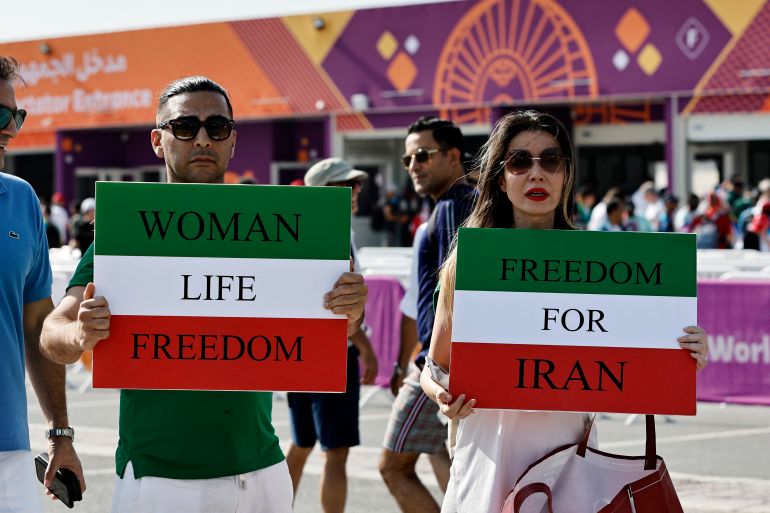Iran attacks positions in northern Iraq targeting Kurdish groups
Iran says Kurdish separatist groups based in northern Iraq are destabilising Kurdish-majority provinces in western Iran as anti-government protests continue.

Tehran, Iran – Iran’s Islamic Revolutionary Guard Corps (IRGC) has attacked positions in northern Iraq held by Kurdish groups, as anti-government protests continue in Iran’s Kurdish-majority western regions and elsewhere.
The elite force’s ground division confirmed early on Monday that it had hit three areas in the Kurdish region of northern Iraq with missiles and drones and inflicted “heavy damage” on two Kurdish groups that Tehran considers to be “terrorist” organisations.
Keep reading
list of 3 itemsVideos claim to show home of Iran’s late leader Khomeini on fire
New IAEA resolution censures Iran over insufficient cooperation
The semi-official Tasnim website, which is close to the IRGC, cited local sources as saying 26 members of Komala and the Democratic Party of Iranian Kurdistan groups were killed in the attacks.
The United States Central Command condemned the cross-border attacks in a statement, saying they violated Iraqi sovereignty and “jeopardise the hard-fought security and stability of Iraq and the Middle East”.
The IRGC has attacked positions it said were held by the groups several times since the beginning of protests in Iran more than two months ago, as it maintains they smuggle weapons into the country and carry out operations to destabilise it.
The latest attack comes days after the IRGC’s Quds Force commander, Esmail Qaani, travelled to Iraq for high-level meetings, and after repeated warnings by Tehran to Baghdad to disarm or relocate the groups.
Protests erupted across Iran in mid-September after the death in custody of Mahsa Amini, a 22-year-old woman from Saqqez in Iran’s Kurdistan province, who was arrested by the country’s morality police in Tehran for allegedly not adhering to the country’s dress code for women.
In the past few days, protests have been most intense in northwestern Kurdish-majority provinces, with videos continuing to come out from several cities, including Mahabad, Bukan and Piranshahr in West Azerbaijan and Javanrud in Kermanshah.
In Mahabad, several videos circulating online, which could not be independently verified, showed a convoy of heavy armoured vehicles reportedly deployed by Iranian authorities, while the sound of gunfire could be heard in some videos and others showed helicopters flying overhead.
The IRGC confirmed in a statement on Sunday that it is “strengthening” its forces in the country’s northwestern regions, in what it said is a response to activities by “armed thugs and separatist terrorists”.
Foreign-based human rights organisations have reported that several people were shot dead by security forces in protests on Sunday night.
Iranian authorities have consistently denied that security forces use live bullets.
Authorities have not provided an official tally of the total number of people killed since the start of the protests, but have said that more than 50 members of the security forces have been killed during “riots” and operations by foreign-backed “terrorists”.
Rights groups say more than 400 people have been killed, including about 60 children.
Tehran has accused foreign powers, including France, Germany, Israel, Saudi Arabia, the United Kingdom and the United States of being behind the country’s unrest.
It has also responded to sanctions by several Western governments with sanctions of its own.
Footballer supports protests
With the unrest continuing in Iran, the country’s national football team has come under scrutiny from the international media as it prepares to face England on Monday afternoon in both teams’ World Cup opener.
Iran and England are both in Group B, along with the US and Wales.
During a press conference on Sunday, the Iranian team’s captain, Ehsan Hajsafi, appeared to implicitly voice support for the protests, expressing condolences to families who have lost loved ones.
He also began his comments by saying “in the name of the God of rainbows”, a reference to a sentence used in a video by Kian Pirfalak, a nine-year-old boy who was killed after he was shot in the town of Izeh, in Khuzestan province, last week.
Pirfalak’s mother blamed security forces during his funeral, but authorities said “terrorists” riding a motorcycle killed him and six others.
Karim Bagheri and Yahya Golmohammadi, two former players for the national football team and current members of the backroom staff at the leading Iranian club Persepolis, were punished on Sunday for publishing posts in support of the protests on their social media accounts.
Bagheri was fined 20 percent of his salary, while Golmohammadi was fined 15 percent.
Two actresses, Katayoun Riahi and Hengameh Ghaziani, were also arrested on Sunday.
They had filmed themselves without a head covering in support of the protests.
Iran on Sunday issued a sixth protest-linked death sentence, saying the person sentenced had blocked a major street in Tehran, fought with Basij paramilitary forces using a weapon, and “terrorised” civilians.